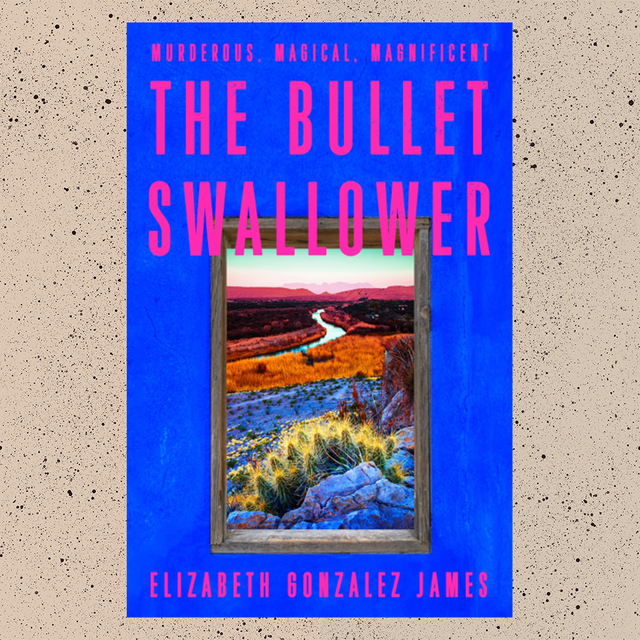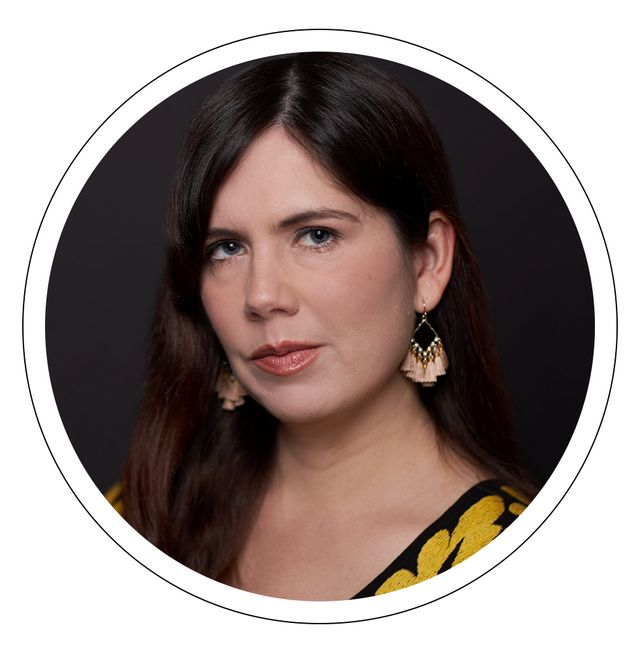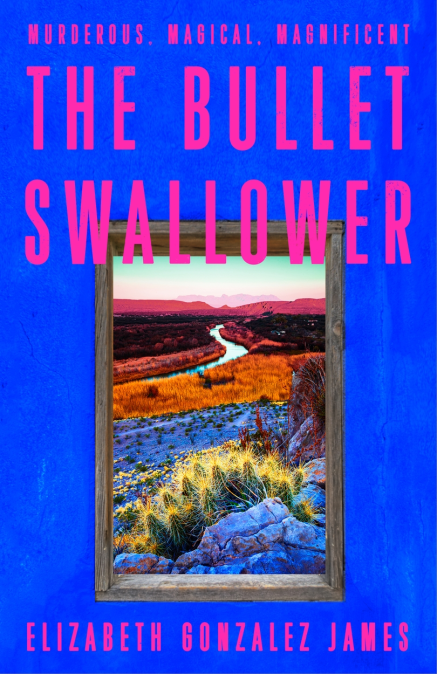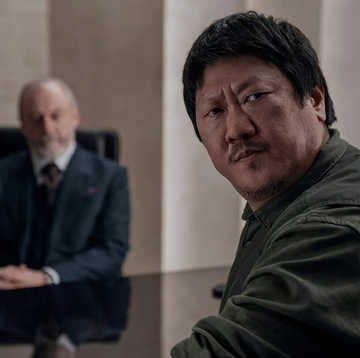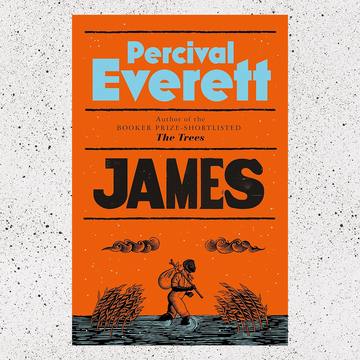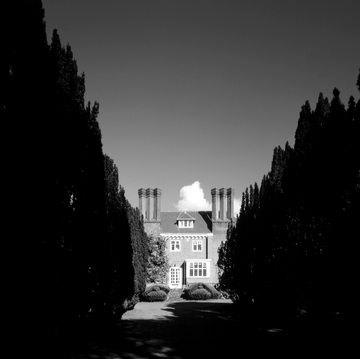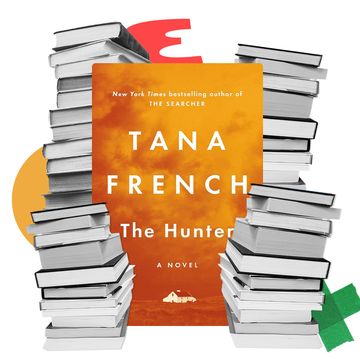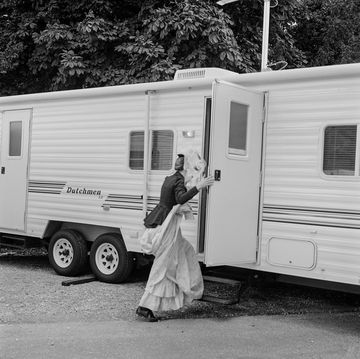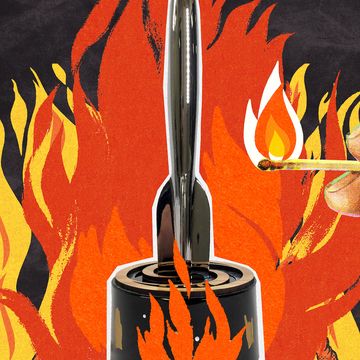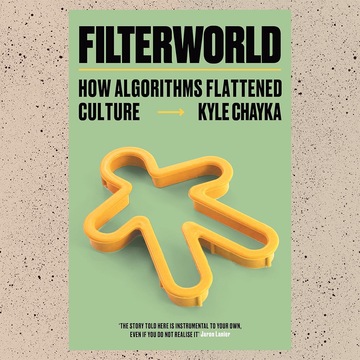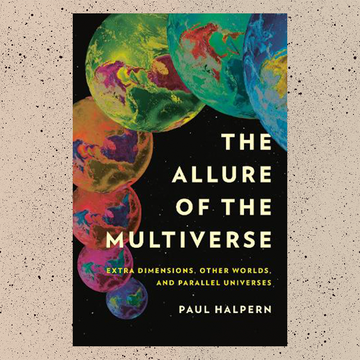What’s the case for the western in 2024? Once a backbone of cinema and literature, the genre looks downright dated to contemporary eyes, steeped as it is in harmful American mythologies of racism, colonialism, and toxic masculinity. Westerns endure, but they’re long overdue for radical change—and now, change is here.
According to author Elizabeth Gonzalez James, westerns are undergoing a renaissance, with those who were sidelined, villainised, or victimised now telling their own stories. A new wave of westerns featuring Black, queer, Asian, and Indigenous characters is striking the genre like a depth charge. “It’s not a reimagining of history; it's just history,” James tells Esquire. “It’s the truth of the people who were there. We’re going to keep seeing more of these stories, and I think it’s wonderful.”
With the release of her second novel, The Bullet Swallower, James is making her own mark on the new frontier of westerns. Set in 1895 at the border between Texas and Mexico, the novel centres on Antonio Sonoro, the scion of a moneyed but deplorable family living in Dorado, Mexico. After a train robbery gone wrong outside of Houston, a shootout with the Texas Rangers leaves Antonio’s brother dead and Antonio horrifically disfigured, earning him the nickname “El Tragabalas” (the bullet swallower). Antonio’s quest for revenge against the Rangers takes him through the heart of the Texas badlands, where he weighs his violent impulses against the opportunity for repentance. Meanwhile, in a parallel narrative set in 1964, Antonio’s grandson Jaime, a Mexican movie star, transforms his grandfather’s story into a feature film, hoping to redeem the Sonoro name. Linking the two narratives is the mystical stranger Remedio, a reaper of souls guiding the Sonoros toward the light.
Though the story is purely fiction, its disparate parts are the stuff of real-life legend; James, raised at the Texas-Mexico border herself, is the great-grandaughter of a bandido who was shot in the face and left for dead by the Texas Rangers, earning him the name of “El Tragabalas.” The Bullet Swallower crackles with the whizz-bang action that any tale of gunslingers demands, but it also digs deep into the dark corners of this mythology: James is unflinching in her depiction of how racism has impacted Antonio’s life, and how his family has historically exploited Dorado’s Indigenous inhabitants. Rich in lyrical language, gripping action, and enchanting magical realism, the novel is a heartening entry into the future of westerns.
James Zoomed with Esquire to discuss life at the border, her own family history, and the particularly male fantasy of the western. This interview has been edited for length and clarity.
ESQUIRE: Tell me where The Bullet Swallower began for you, and how it took shape over time.
ELIZABETH GONZALEZ JAMES: It’s loosely based on a true story. My great-grandfather was a bandido, and the story I heard growing up was that after he was put in jail in Houston, he broke out, he was chased down by the Texas Rangers, and he was shot in the face and left for dead. But he lived, and after that, they started calling him El Tragabalas, which means “the bullet swallower.” I had that seed, but it took quite a while to flesh it out into a larger novel. I was also inspired by my reading about the historical time period: the late 1800s in Texas and around the Texas / Mexico border. It all went into the big bouillabaisse in my brain.
What about that moment in history did you find so interesting?
Originally I had wanted to write the novel using my dad's name and my great-grandfather's name; it would be a fictionalised retelling about real people. For a variety of reasons, that didn't work out. I didn't have enough latitude to make it interesting. My interest in the time and place came from wanting to stick to the basic facts of the story. My dad was born in a village called Mier that his ancestors founded in Mexico; it's not on the border, but it's pretty close to the border. When I was writing original drafts of this, I was calling it Mier, but over time, it changed to the fictionalised town of Dorado. An interesting fact of the geography of this town is that it's bordered on two sides by the Alamo River. I remember swimming there when I was a kid. It’s got this pointed shape at the top of it where the river splits apart; it goes around it and then connects back. I was trying to imagine what might happen that could break a piece of the land off and create this island. It all came from the real facts of this town that I haven't visited since 1992, but that my family has very deep roots in.
In one of my favourite passages of the book, you write, “Antonio never believed in curses or bad legacies. He lived in a poor region in a poor country, peopled by ignorant peasants ground down by centuries of exploitation, ruled by a corrupt and avaricious government bounded by, on one side, a hostile foreign power with no regard for economic parity or national sovereignty, and unlucky enough to have survived a long drought.” I loved the authorial sleight of hand here. What another magical realist novel might explain away as a curse or a bad legacy, you explain as the hard realities of colonialism. What’s the connective tissue between colonialism and magical realism, for you?
In One Hundred Years of Solitude, there's a whole chapter involving workers who were gunned down because they were protesting conditions at a banana plantation. Marquez addressed it head on there.
You have a similar scene in that first chapter of the novel, where the owner of the gold mines in Dorado kills his Indigenous workers for going on strike.
A lot of that is actual fact. I don't know of an entire tribe of Native people being wiped out by a mine owner, but working conditions were just abominable in mines in Latin America. Yuri Herrera wrote an amazing book called Silent Fury, which tells the story of just one of the probably thousands of tragedies surrounding mining operations. I think that scene was me wishing that there would be some kind of consequence for the way that Native people in Mexico and Latin America were treated. I wanted some justice where really, there was none. As for the “magical” part of magical realism, that’s just where my brain wants to go. If I can think of a way to make a mundane setting feel magical and otherworldly, I’m going to lean into that. It’s what I want to read and how I want to see the world.
Elsewhere in the book, a character muses, “It's the strangest thing: I was born in New Spain, which then became Mexico, then the Republic of Texas, and then wound up in the United States, and meanwhile, my house has always stood in the same place. The Texans call me Mexican and I've never even crossed the Rio Grande.” How were you thinking about borders as you were writing this book?
I grew up on the border in Laredo, Texas. The setting of The Bullet Swallower dictated that I spend some time talking about borders and how arbitrary they are. They’re chosen sometimes at random, and people are just supposed to live with the consequences. Having grown up on the border in the eighties and nineties, before the cartel violence that’s very pervasive today, I always saw the border as a very fluid place. I went to Catholic school when I was young, and a lot of the students at the school lived in Mexico; they commuted across the border every day. Other people have doctors or dentists across the border. When I was a kid, people never lived here or there; they always lived with one foot on each side. I’m Mexican-American, and I had family living in Nuevo Laredo while we lived in Laredo. They’re like twin cities that just happen to sit across the water from each other.
What I was trying to show in the book is that borders are permeable. In the case of the Rio Grande, sometimes it literally does dry up, and the border is not even there. There's this beautiful concept that I came across called Nepantla. It’s an old word that comes from the Nahua people of Mexico, meaning “a state of in-between-ness.” The writer Gloria Anzaldúa wrote beautifully about growing up on the border and how it's a state in-between-ness. You're not here, you're not there; you're just in the middle. She wrote about it with such sacredness. It's a special perspective that those of us who grew up on the border get to have, because we get to see things from two sides instead of just here or there. I hope that with the novel, I was able to complicate the picture of what the border is, because it’s a very complicated place.
The novel has all the rough and tumble elements I want from a Western: a train robbery, a shootout, a cantina scene, etc. You deliver on the staples that make the genre exciting, but at the same time, I’m curious: what tropes did you want to avoid or deconstruct?
I wish I could say like I sat there and thought, “I’m going to have a cantina scene and a brothel scene and a train robbery,” but I didn’t think about tropes, even though I’m a meticulous outliner. The one thing that was important to me was that I didn't want it to be the case that all the Texans were the bad guys and all the Mexicans were the good guys. Of course, that's not reality. I purposely included Casoose, a Mexican man who joins with the Texas Rangers; he was a real person. I included him because I wanted to complicate the picture of how trauma and vengeance can pervert a person. Likewise, I included Peter, an English character who’s not always aware of his position of power, but he’s still a good person and a loyal friend. I encountered so many interesting people in my research, so if they were especially charismatic, I grabbed them and stuck them in that hole.
Speaking of the train scene; early in the novel, you write of Antonio, “He needed to find that train as much for what it contained as what it symbolised—something he couldn’t yet articulate but that comprised no less than his manhood, freedom, and divine right.” How much do you think masculinity is bound up with westerns?
The western is a subconscious fantasy of many men. In much the same way that we just found out how men are sitting around thinking about the Roman Empire all the time, I think there’s a lot of male brain power spent fantasising about how one man against the elements can make his mark in the wide open expanse of the world. Men wonder, “Could I get out there, live off the land, brave the elements, and make it?” These ideas are all very much tied into Old West cowboy mythology.
How might westerns change if they became less bound up in masculinity?
Well, they're changing now. There are so many really interesting westerns that are getting published nowadays. A good example is The Thousand Crimes of Ming Tsu, by Tom Lin, where a Chinese American man goes on a quest for revenge against the men who have kidnapped his wife. Another one is Lucky Red, by Claudia Cravens, or Book of the Little Axe, by Lauren Francis-Sharma. These are books with Black, queer, Asian, or Indigenous characters that are firmly set in the Wild West. They tell the stories of people who were there, but their stories just haven't been told yet. The Wild West is a really captivating place and time in our history, and now that publishers are making more space in their catalogs for stories told by people who haven’t traditionally been given the privilege to tell stories, we’ll keep getting more and more of these books. It’s not a reimagining of history; it's just history. It’s the truth of the people who were there. We’re going to keep seeing more of these stories, and I think it’s wonderful.
I love how you wrestle with the idea of justice in this book—there’s a lot to question here, such as, is revenge a just cause? Is it just for younger generations to pay for the sins of their ancestors? But the final chapters of the book, where we see an older Antonio making reparations to his community, really surprised and moved me. Why did that feel like the right ending for this character?
I wasn't afraid of pushing the story as far as it could possibly go. When Antonio gets back from Texas, there isn't a happy ending waiting for him. If I had ended it there, it would have been a tragedy, and that wasn't the story I wanted to tell. Ultimately, the book asks the question: can we be better than our forebears? I truly believe that the answer is yes. But if that's the answer, then I had to show the answer. I've known people like Antonio in my life, who when they're young, they’re full of anger and resentment. They can become better people, but usually, it takes decades of mellowing out and gaining wisdom. That fed into the lesson that Antonio has to learn.
Late in the book, you write, “It felt like a satisfying story, one of discovery and redemption, and it was something he felt sure an audience would find meaning in. But now that it was all told and printed in black and white, he felt a strange sense of disappointment. He’d told a story, but was it the story? He’d narrated a life, but what on earth did he really know about Tragabalas?” Did you feel any of this same anxiety about nailing down the story of your great-grandfather?
Definitely. There are quite a few passages like this one that are just me fully tipping my hand, and I’m fine with that. I felt like that was part of the story, too. Part of the story was me trying to tell the story and not being able to tell the story. The story was so much bigger than what I could get down on paper. I wanted to get that sense of loss into the book. Those are some of my favorite parts of the book, when I step into the frame selfishly to talk about how no novelist can ever be satisfied with what they’ve done. Most of us close the laptop and think, “Well, maybe the next one will be the one where I get it right.”
Now that these family stories have lived inside you for so long, as you’ve turned them into the stuff of fiction, how has your perspective on those stories changed?
What I've learned is that family stories are just stories, and they're going to be different depending on who you ask, when you ask, and how that person is feeling when you ask. When I had the idea for this book nearly 11 years ago, I had a naive conception of what the truth is and also a naive conception of how a book comes to be. The truth is difficult and multidimensional. If I get in a fight with my brother, my telling is going to be different than the way my brother tells it.
As for my naive conception about how a book is created, I had this idea that a book is an ideal platonic form. I thought that if I could just write it down and get it right, it would be this perfect, fixed thing that I could reach. But I'm coming to see now that a book is a lot more like a moving river. You can never step in the same river twice. If I wrote The Bullet Swallower today, it would be different than what it looks like now. There's stuff in the book that was extremely reactive to real-time events that were happening in the world. I was editing parts of it in 2016 and 2017, when kids were being kept in cages, and during the school shooting in Uvalde. That’s all in there. I know where it is, even if the reader doesn't. The book is not the same because the world changed as it was written. Now that I understand that, it makes it easier for me to live with the idea that a book is not a fixed thing. It’s a shifting thing I’m trying to catch and put down on paper.
Adrienne Westenfeld is the Books and Fiction Editor at Esquire, where she oversees books coverage, edits fiction, and curates the Esquire Book Club.
